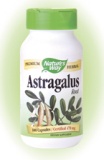| |
Astragalus |
|
| Astragalus (also known as Huang qi, milk vetch) is native to northern China and the elevated regions of the Chinese provinces Yunnan and Sichuan. Astragalus actually is the root of the Astragalus membranaceus plant, which is a member of the pea family. The portion of the plant used medicinally is the four-to seven-year-old dried root collected in the spring. Although there are many varieties in the Astragalus family (such as Astragalus e.g., Chinensis, Lentiginosus and Trigonus), Astragalus membranaceus is the sole medicinal type. Astragalus has been used in traditional Chinese medicine for over 4000 years as a tonic and an antipathogen. Astragalus is a good source of selenium, an antioxidant and immune system stimulant. |
| |
Active constituents of astragalus |
|
| The main constituents of Astragalus membranaceus include polysaccharides, saponins, flavonoids, amino acids, trace elements, and organic compounds. The polysaccharides found in Astragalus play a role in immunomodulatory actions. Polysaccharides A, B, and C have been identified as glucans, and polysaccharide D as a heteropolysaccharide. Mineral trace elements found in Astragalus include zinc, iron, copper, magnesium, manganese, calcium, potassium, sodium, cobalt, rubidium, molybdenum, chromium, vanadium, tin, and silver, tantalum, hafnium, europium, and thorium. Organic compounds identified in the roots include choline, betaine, gluconic acid, sitosterols, aromatic compounds, essential oil, linoleic acid, aminobutyric acid, bitter compounds, and asparagine. |
| |
Medicinal uses and health benefits of astragalus |
|
Astragalus strengthens metabolism and digestion, raises metabolism, aids in strengthening the immune system, and is used in the healing of wounds and injuries. Astragalus is an adaptogen, a type of nontoxic natural substance that helps the body maintain its normal balance of health and wholeness and increases the body's endurance and resistance to a wide array of physical, chemical, and biological stressors. Astragalus enhances body energy. It promotes metabolism of serum and liver proteins, stimulates growth of antibodies, increases white blood cells, and thus increases resistance to viruses. Taken as a tonic, astragalus is believed to build stamina and vitality. Adaptogens help normalize the functioning of various body systems by affecting the action of hormones. Astragalus inhibits gastric secretions, reduces gastric acid, and thus helps cure stomach ulcers.
Astragalus strengthens immunity to disease. It demonstrates its strongest actions in cases of chronic (long-term) conditions through a tonic action. Astragalus has been traditionally used for strengthening the immune system and helping prevent bacterial and viral infections. Astragalus stimulates production and activation of the white blood cells, which fight infection. It helps increase and protect the number of white blood cells in the body needed for a healthy immune response. Astragalus has certain inhibiting effects on molecular pathological changes caused by viruses, increases growth of plasma cells, stimulates synthesis of antibodies, and builds up body defense. By boosting the immune system, Astragalus may help reduce the risk of a person becoming ill with a bacterial or viral infection. Astragalus also stimulates the adrenal glands, whose functions are suppressed in cancer.
Astragalus may enhance the effectiveness of conventional treatments for cancer, such as chemotherapy and radiation. Many people undergoing cancer chemotherapy or radiation take astragalus to fortify their battered immune systems. Astragalus may also lessen the degree of side effects experienced with cancer treatments and improve quality of life. As an antioxidant, it helps to counteract cell damage caused by unstable oxygen molecules called free radicals. It reduces toxic side effects and enhances therapeutic effects. Cancer patients who take astragalus during or after cancer treatments tend to recover more quickly from the ill effects of the treatment.
Astragalus has protective and strengthening effects on the heart. The saponins found in astragalus help prevent blood vessels from sticking together and fatty plaques from forming in the arteries of the heart which can block the flow of blood. Astragalus membranaceous may improve arrhythmias, creatinine phosphokinase levels, and cardiac function. Astragalus helps relieve chest distress and breathlessness due to a weakened heart, discourages retention of salt and water, and tends to combat clots. Astragalus may also help reduce high cholesterol levels and regulate blood pressure. |
| |
Side effects, precautions, interactions of astragalus |
|
| Astragalus is generally safe and the side effects are rarely reported. Astragalus may interfere with the actions of diuretics, phenobarbital, beta-blockers, and anticoagulants. Astragalus may increase the effects of some antiviral medications such as acyclovir and interferon. Astragalus may also counteract the immune-suppressing effects of cyclophosphamide, a medication used to reduce the chances of rejection in transplant recipients. Astragalus may increase growth hormone levels. Individuals with allergies to members of the Leguminosae (pea) family are more likely to have allergic reactions to astragalus. |
|
|
|
|
